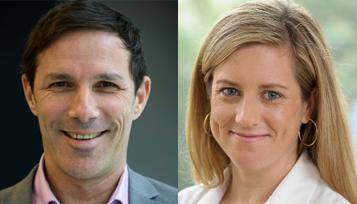
City College's Lucas Parra and Elizabeth Sutton of MSK lead a $4 million NIH-funded breast cancer screening study utilizing machine-learning.
The City College of New York and Memorial Sloan Kettering Cancer Center (MSK) are the recipients of a $4 million grant from the National Institutes of Health to use machine-learning for early breast cancer detection in high-risk women. The five-year project will analyze 100,000 breast exams from MSK, as well as data from Duke University and Johns Hopkins University.
The project, “Machine learning for risk-adjusted breast MRI screening,” will be co-led by Lucas C. Parra, Harold Shames Chair and Professor of Biomedical Engineering at CCNY, and Elizabeth J. Sutton, MD, Associate Member in MSK’s Department of Radiology and breast imaging specialist. The project will leverage modern machine learning techniques to analyze medical images, an area of expertise for Parra. The goal will be to detect breast cancer as early as possible while limiting the burden of screening in high-risk women.
“Over the last two years, clinicians, engineers, and physicists from CCNY and MSK have collaborated and have now identified this area of study where artificial intelligence can potentially have a real clinical impact,” said Parra. “Radiologists are very good at identifying malignant lesions however, it is harder for them to quantify risk of future lesions. The volume of patients seen at MSK gives us the unique opportunity to predict risk of future lesions using machine learning. Now, we may be able to avoid unnecessary exams and have the potential to detect some breast tumor earlier.”
Risk will be estimated from magnetic resonance images (MRI) of the breast, as well as mammograms using deep learning techniques -- a type of machine learning that emulates learning in the human brain through many layers of processing. A retrospective analysis of a very large dataset will determine if some women could have avoided unnecessary scans without missing newly developing cancers.
“We’re hopeful the results from this study will enable us to take steps towards precision screening in the future where we can determine the required breast MRI screening interval for each individual at increased risk of breast cancer,” said Sutton.
MRI is currently the most sensitive imaging modality for breast cancer diagnosis. Women with a strong family history or related genetic mutations have an elevated risk of breast cancer and are recommended to participate in yearly screenings using this technology. However, the rate of detection in this high-risk cohort is small, prompting a desire to reduce unnecessary MRI exams. Click here to read the entire summary and aims of the project.
The collaboration between CCNY and MSK has benefitted from the appointments of Parra as affiliate faculty at MSK, and CCNY physicist Hernan Makse, an early contributor to the project. This project is also one of many collaborations between the institutions. Since 2002, the CCNY-MSKCC Partnership has endeavored to produce future cancer researchers and can count an 83 percent success rate in trainees that go on to pursue higher academic tracks. This partnership has now been extended for five more years, thanks to a $14 million NIH grant.
About the City College of New York
Since 1847, The City College of New York has provided a high-quality and affordable education to generations of New Yorkers in a wide variety of disciplines. CCNY embraces its position at the forefront of social change. It is ranked #1 by the Harvard-based Opportunity Insights out of 369 selective public colleges in the United States on the overall mobility index. This measure reflects both access and outcomes, representing the likelihood that a student at CCNY can move up two or more income quintiles. In addition, the Center for World University Rankings places CCNY in the top 1.8% of universities worldwide in terms of academic excellence. Labor analytics firm Emsi puts at $1.9 billion CCNY’s annual economic impact on the regional economy (5 boroughs and 5 adjacent counties) and quantifies the “for dollar” return on investment to students, taxpayers and society. At City College, more than 16,000 students pursue undergraduate and graduate degrees in eight schools and divisions, driven by significant funded research, creativity and scholarship. CCNY is as diverse, dynamic and visionary as New York City itself. View CCNY Media Kit.
Jay Mwamba
p: 212.650.7580
e:
jmwamba@ccny.cuny.edu
View CCNY Media Kit.